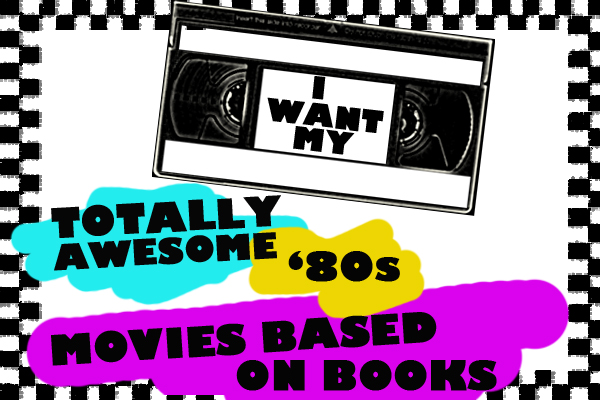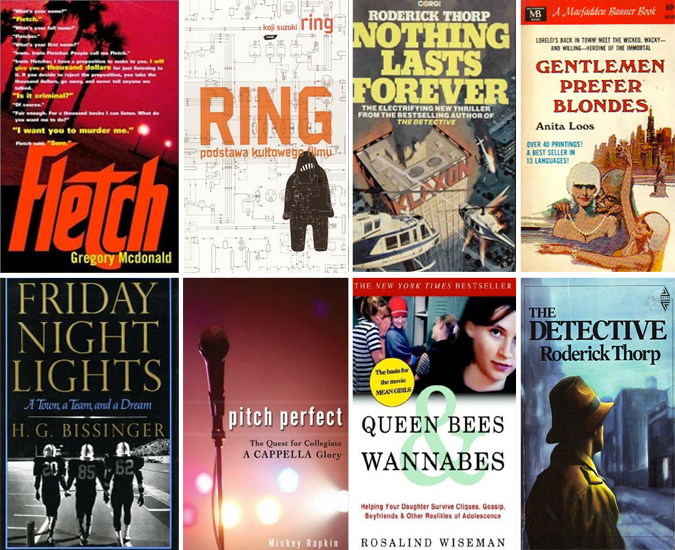Twelve Totally Awesome ’80s Movies Based On Books
The ‘80s: Jake Ryan, Aqua Net bangs, Trapper Keepers, where babysitters went on adventures, Goonies never said die, and Sweet Valley High made us wish we had a twin. *Wipes nostalgic tear.*
Until I can find Doc and a time traveling DeLorean I visit the ‘80s like everyone else, via movies. But did you know lots of your favorite ‘80s movies were adapted from books? Whether the book is better than the movie (nearly always the case) it is, at the very least, partially different and contains more information. So here are 12 totally awesome ‘80s movies adapted or inspired from books you’ll probably want to read.

First Blood—Not to be confused with the Rocky series where Stallone screams Adrian! and runs up the stairs at Philadelphia’s Museum of Art. This is Rambo, a troubled Vietnam Vet who ends up at war with a small town’s sheriff and police force. The film is based on David Morrell’s First Blood, which Morrell says was a text Stephen King used when teaching creative writing. That may be a better endorsement than an Oprah sticker.

Fast Times At Ridgemont High—Not only was the film based on a book, it was based on a non-fiction book Cameron Crow wrote after going back to high school as an adult—Undercover! Sounds a bit 21 Jump Street to me, and something you could only get away with in the ‘80s. Being that it’s one the most searched for out-of-print books I recommended buying it if you ever see it in a yard sale.

Die Hard—The movie: terrorists, a skyscraper, and John McClane (an NYPD cop) with a smart mouth—Now I have a machine gun. Ho-Ho-Ho—trying to save his wife and the rest of the guests at a Christmas Party gone very wrong. The book, Nothing Lasts Forever: terrorists, a skyscraper, and Joe Leland (a retired NYPD detective) trying to save his daughter and the rest of the guests at a Christmas Party gone very wrong. If 25+ years later you’re still quoting the movie, the book should probably be added to your TBR list.

Blade Runner—After playing Han Solo and Indy, Harrison Ford stepped into the role of Rick Deckard, a bounty hunter after replicants (artificial humans). The movie—like most ‘80s classics was not a blockbuster success at the time, but is now argued to be one of the greatest sci-fi films and analyzed for its noir characteristics—is a retelling of Philip K. Dick’s novel Do Androids Dream of Electric Sheep?. The title alone is enough to make me read the book; talks of Ryan Gosling starring in the sequel, alongside Harrison Ford, is just icing on the cake. Unless, you’re a sequels-always-suck believer in which case ignore the last thing I said.

Fletch—Decades before annoying fellow classmates on Community Chevy Chase played Irvin “Fletch” Fletcher, a newspaper reporter skilled at quotable one liners, finding stories, trouble and dressing in disguises. The character was loosely based on Gregory McDonald’s Fletch series, which begins in the ‘70s and won the Edgar Allen Poe Award—talk about a case for the book being better than the movie.

Who Framed Roger Rabbit—A cartoon rabbit accused of murder and a human detective who hates toons work/fight together to solve the murder in this live-action/animated film. Oh, and Jessica Rabbit. The film is based on Gary K. Wolf’s Who Censored Roger Rabbit? which reads as a spoof of detective novels and is another instance of a movie very loosely following the book, meaning you won’t automatically know what’s going to happen next.

Stand By Me—A coming of age story set in 1959, full of laughs and feels, about four friends searching for a dead body. The film is based on Stephen King’s The Body, one of four novellas published in Different Seasons. While most people seem surprised to discover the origins of the movie it sounds like Stephen King to me: the main character is a writer, it’s a great story, and there’s a dead body.

Terms of Endearment—A family drama that tells a mother and daughter’s story over thirty years. I always confuse it with the armadillo-cake movie, Steel Magnolias, being that both movies gutted me. Gutted. Must be why it won five Oscars, or maybe because the novel it was adapted from was written by a Pulitzer Prize-winning author.

Field of Dreams—If you write it, they will read it—and adapt it into a movie resulting in the quote, “If you build it, he will come,” being used and heard even by those who haven’t seen the movie. Even Alex Trebek has read a clue about the original book, Shoeless Joe, and the movie on Jeopardy.

Scarface—Say hello to my little book! You know, the one written by Armitage Trail that inspired Howard Hugh’s 1932 film, which inspired Oliver Stone’s 1983 film—all with the same title. Considering the book takes place in the ‘30s, and is supposedly based on Al Capone, it’s obviously very different from the Al Pacino movie based on a Cuban immigrant, in Miami, in the ‘80s.

The NeverEnding Story—Call my Name! Bastian, please! All right, I’ll do it! Die unendliche Geschichte: the German novel written by Michael Ende, translated to English by Ralph Manheim, and then adapted into a film. Apparently Ende is not among the film’s cult following. Now I really want to read the book!

The Princess Bride—When a movie this good has a book that’s even better—it has a zoo of death! and so much more—you have to read the book. You have to! Princess Buttercup commands you. And now you say, As you wish.




